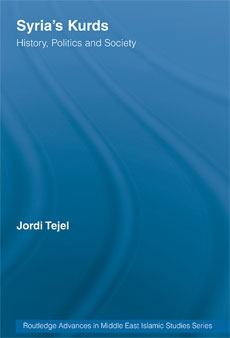| Éditeur : Routledge | Date & Lieu : 2009, London |
| Préface : | Pages : 190 |
| Traduction : | ISBN : 0-415-42440 |
| Langue : Anglais | Format : 155x230 mm |
| Code FIKP : Liv. Ang. 2648 | Thème : Histoire |
|
Présentation
|
Table des Matières | Introduction | Identité | ||
 Syria’s Kurds This book is a decisive contribution to the study of Kurdish history in Syria since the Mandatory period (1920–1946) up to the present. Avoiding an essentialist approach, Jordi Tejel provides fine, complex and sometimes aradoxical analysis of the articulation between tribal, local, regional, and ational identities, on one hand, and the formation of a Kurdish minority awareness vis-à-vis the consolidation of Arab nationalism in Syria, on the other hand. Using unpublished material, in particular concerning the Mandatory period (French records and Kurdish newspapers) and social movement theory, Tejel nalyses the reasons behind the Syrian “exception” within the Kurdish political phere. In spite of the exclusion of Kurdishness from the public sphere, especially ince 1963, Kurds of Syria have avoided a direct confrontation with the central ower, most Kurds opting for a strategy of ‘dissimulation’, cultivating internally the forms of identity that challenge the official ideology. The book explores the ynamics leading to the consolidation of Kurdish minority awareness in contemporary yria; an ongoing process that could take the form of radicalization or ven violence. While the book offers a rigorous conceptual approach, the ethnographic material akes it a compelling read. It will not only appeal to scholars and students of he Middle East, but to those interested in history, ethnic conflicts, nationalism, ocial movement theories, and many other related issues. | |||||
| Table des Matières | ||||
Contents | ||||